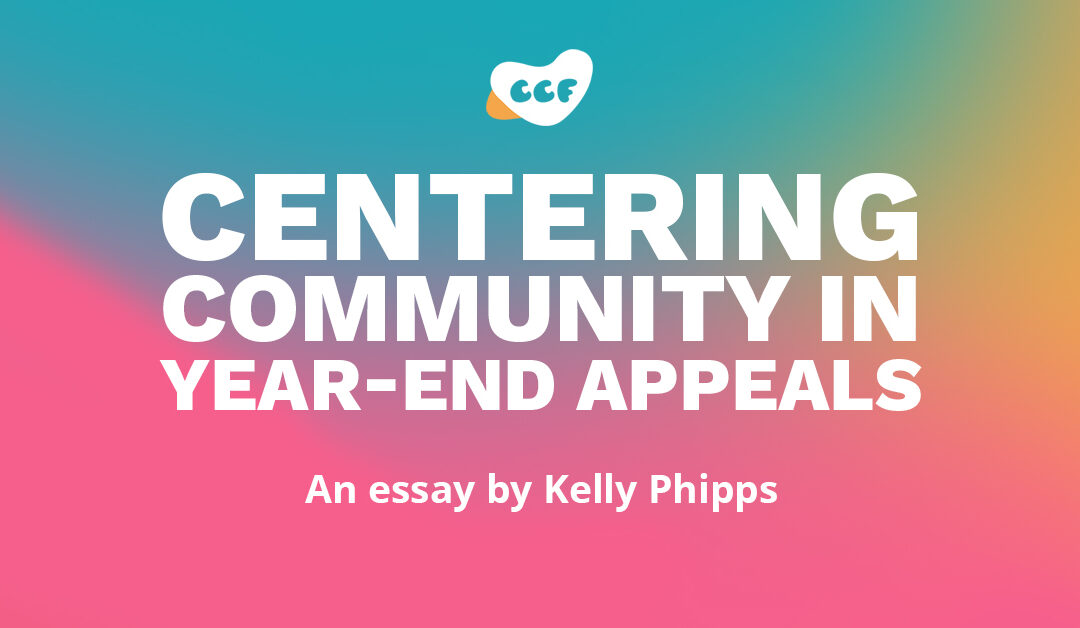By Kelly Phipps, Community-Centric Fundraising Global Council Member and annual giving fairy
Tinkering with the tried-and-true formula of appeal writing to incorporate community-centric approaches can feel daunting. And to be clear, I’m a student of the CCF appeal craft offering my noticings as a jumping off point for future conversations. Ready to learn with me?
There’s an unspoken vulnerability embedded in Holiday giving appeals. Simply check your inbox on Giving Tuesday morning, and you’ll experience the parade of personal testimonies and stories of individuals going through what may be the hardest moment of their life and how we, as readers, are the ones who can save them.
The extractive tension between centering stories that connect donors to an issue and maintaining the storyteller’s agency can be a narrow line to tow. And when the balance is off, it is the individuals who are vulnerably visible that feel the impact.
When I worked at a university, I often felt this tension when navigating appeal writing specifically for scholarship recipients. At first glance, the story of a scholarship recipient is a heart-warming story of a thankful student who one day may be a researcher, made possible by the Frank Smith Award. Yet, on a deeper level–due to systemic issues like the wealth gap, rising costs of housing, and the lack of free higher education–countless college students across the country silently struggle not only to pay tuition but grapple with housing and food insecurity. And the national student debt crisis continues to harm millions. While I wasn’t fully landed into a CCF framework in that role, it was an important lesson learned on the types of questions we as fundraisers can ask when caretaking the stories of those in our community.
Tinkering with the tried-and-true formula of appeal writing to incorporate community-centric approaches can feel daunting. And to be clear, I’m a student of the CCF appeal craft offering my noticings as a jumping off point for future conversations. Ready to learn with me? Here are some CCF appeal approaches that are helpful keep in mind:
1) Ground in values and principles
The Community-Centric Fundraising (CCF) principles and values are a great starting point to ground your appeal writing. To kick it off, challenge yourself to go through each CCF principle or value and ask, for example, “How does my appeal to fund a local food bank relate to equity?”
One surprising way this grounding shifted my thinking was the CCF concept of movement building. It’s very rare that a nonprofit organization would be positioned to solve a societal issue completely on its own. This past spring, this meant that in a Mother’s Day solicitation for an annual program, our appeal uplifted and linked out to our partner organizations to both honor their programmatic role and create opportunities for individuals to support them directly. We also reshared fundraising asks from these same partners on social media. Rejecting the competitive framework that is often the default can create space for a beautiful and community-affirming approach to inviting support.
2) Unearth the real root problem
What is the cause of food insecurity? Why can’t a student afford tuition? Why are the arts underfunded? What are the real drivers of a particular illness? Why is gun violence more prevalent in this city?
No matter what you fundraise for, if you were to ask why the problem your organization seeks to fix exists, it always points to a systemic problem. Naming the systemic “why” is important — without situating a social issue within the framework of systems-level drivers, we can inadvertently place “blame” onto those most impacted through a flimsy lens of personal choice or lack of knowledge.
For example, it’s easy to say that a particular neighborhood has high rates of an illness because they don’t know how to eat healthier. A zoom out to the real root problem, however, would reveal how corporations intentionally deprive certain communities of healthy food options, or how the weathering effect of racism and existence of medical racism not only lead to increased illness in people of color but those community members are also less likely to get a diagnosis because of factors outside their control.
Naming these root problems can feel radical and political. And yes, it is.
I’m a big believer in “familiar language.” The takeaway here is not that you have to put the phrase “systemic oppression” in your appeal letter. Framing information in ways that are understandable for your audience, to call people into a belief in a relationship-centered way, is powerful.
The definition of what familiar language is depends on the audience. It requires having somewhat of a pulse on how your audience feels about a topic, their level of proximity to the topic, and other specific factors. It’s also important to be clear that using familiar language should never whitewash the radical. It’s one thing to use a defining sentence instead of jargon to ensure the audience understands a concept, it’s another to erase sharpness of your framing by shying away from the hard thing. I often find I can strike this balance by being specific.
For example, an appeal letter may say, “Minority students are underrepresented at the university because they need scholarships to afford college.” But through leaning into specificity and familiar language you can better uplift the root causes you instead could say “Each year, thousands of Black students are in jeopardy of graduating simply because they can’t afford tuition. The hurdles to fairly access education have increased as the cost of living impacts worsen the acute harm unjust policies and practices have created for working class Black and brown communities.”
Ensuring the “problem” in your appeal points to the systemic in a way that brings your audience along is key to centering the dignity and humanization of your community.
How would you write this example? Let me know!
3) Maybe we don’t need heroes
Do we need heroes or do we need community?
CCF and donor-centric discourse can easily fall into a false binary. Writing your holiday appeal doesn’t mean that you forgo painting a clear and compelling picture of how a donor has a role as a partner in your work.
However, there are two problems with centering the donor as the singular “hero.” One is that it strips the benefiting communities, identities, and people of agency. The second reason is that it’s also incomplete.
When we think about who drives in-community solutions and work, those most impacted by a societal problem often have the expertise and leadership. For example, the strategies and policy visions within criminal justice advocacy work are sharpest when led by system-impacted people. Within reproductive and gender justice work, it is trans people, women (especially Black women), pregnant people, those who have had abortions, and those impacted by gender-based violence who are the impact-makers.
If your appeal is focused on an individual, this shift often means uplifting their personal agency and expertise within the outcome of their story. When speaking more broadly, it might mean specifically naming the ways community expertise is infused in your work. You might name how a new research program was born from cancer survivors who saw a gap in outcomes and advocated for that focus, or how a community outreach program is making unprecedented impact because of who is leading the outreach specifically.
This should also feel true to how your organization operates to be genuine. If the community your nonprofit focuses on isn’t represented in leadership, on your board, in spaces where they can offer insights, the tension you feel within your appeal writing is actually pointing to a larger conversation needed at your nonprofit.
Stepping back from the hero-mindset within your appeal is exciting because it creates space to likely spotlight the voice of someone whose leadership is largely unseen by society.
4) Get specific in the ask
We’ve often been taught that specificity in “the ask” is best practice. And I think there is a deeper “why” to underscore the importance of being specific about how a donor can help. It’s really easy to lean into the compelling, inspirational ask in a Holiday appeal. The one that makes it seem like their gift will solve world hunger and make the nonprofit’s mission possible.
While it’s true that a donation to STEM education for girls will help close the STEM representation gap, making clear how a gift of $200 means that one girl can access a computer training that is a prerequisite to attending a university program by covering the cost of her tuition is exciting too. It makes it clear how the donor made an immediate difference while understanding the larger context (closing STEM representation gap).
It’s more actionable too. Understanding how my $200 is helping someone in a concrete way is more believable than thinking my $200 ended tech sexism. And it does so in a way that makes my contribution feel important and without taking away from the agency of the recipient. It’s still her skills, dream, and hard work that will drive her future success.
5) Cherish gratitude
Fundraising in a community-centric lens is, in many ways, a balancing of complicated truths. We are fighting for a world that aligns with our justice-centered values while still operating within a societal structure that is capitalistic and riddled with power dynamics and oppression.
Within this balance, though, gratitude is still a necessary strategy and value. Community-centric fundraising calls us towards deeper, more authentic relationships, not only with our community but with our donors. It invites people into a framework that celebrates the contributions of everyone’s role.
A lot of angst that fundraisers have when falling into the donor-centric vs. community-centric trap is thinking that the centering of community erases gratitude to the person making a gift. To that, I say, throw gratitude around like confetti.
Be thankful for the leadership of communities driving social change.
Be thankful for the individual who realized their privilege in having an extra $3,000 and decided to donate it with no strings attached.
Be thankful for the beautiful constellation of people, roles, and resources that together care about ending illness, closing an equity gap, ensuring everyone has housing, or human rights needs.
Because it’s truly together that change happens.
If someone can understand the real problem, their role in supporting the leadership of communities, and your thankfulness for that partnership when reading your holiday appeal—congrats! You just wrote your first CCF appeal.

Kelly Phipps
Kelly Phipps (she/her), is a doting auntie, audiobook-lover, and dog-cuddles enthusiast. When she isn’t in the thick of an Afrofuturist novel or learning to dance, Kelly serves as the fundraising and communications director at a social justice organization.
Kelly has spent the last decade in nonprofit fundraising and communications (in healthcare, higher education, and grassroots community work) and is excited to co-learn community-centric approaches with others who care about mobilizing resources for our communities. You can connect with Kelly here.
Discover more from CCF
Subscribe to get the latest posts sent to your email.


Thank you for putting together this grounding exercise as we are all drafting our appeals. Appreciate you and the work you’re doing to drive our sector towards equity and liberation!